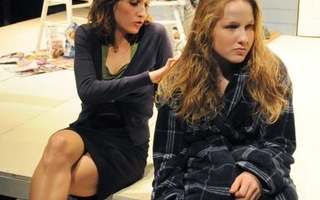Representatives from the Harvard University Health Services and Drug and Alcohol Peer Advisors previewed Harvard Proof, a new alcohol education program tailored to the Harvard student that will replace AlcoholEdu this fall, during the monthly Committee on Student Life meeting Thursday morning.
Harvard Proof features current College students reenacting realistic situations encountered on a night out, and the party scenarios included in the program are set in the dorm rooms of Harvard Houses.
The system will take the place of AlcoholEdu, the online alcohol prevention program currently used by Harvard and universities across the country. Harvard Proof will launch in the fall for the Class of 2017.
Michelle Mandino, project manager and prevention specialist at Harvard’s Office of Alcohol and Other Drug Services, and Melanie J. Comeau ’13, a DAPA representative who served as creative director for Harvard Proof, discussed the new program before a group that included College administrators, House Masters, and members of the Undergraduate Council.
They demonstrated a prototype of the program, which includes short videos and interactive activities like a pour-your-own-drink simulation that shows students the serving size of various drinks in red Solo cups.
The program stresses the existence of the College’s amnesty policy, which encourages students to bring intoxicated friends to UHS by promising no further disciplinary action.
Administrators said that because the program is specifically designed for the Harvard student, they believe it will engage incoming freshmen better than AlcoholEdu, a generic program meant to reach a broad, nation-wide audience.
“We felt strongly that a more streamlined, Harvard-specific course for students by students had the potential to positively impact incoming freshmen,” director of the Office of Alcohol and Other Drug Services Ryan M. Travia wrote in a statement to The Crimson.
Travia wrote that the new interface will be more efficient, allowing students to complete their alcohol education in an hour, as opposed to the three required by AlcoholEdu.
“I think it’s supremely well done,” said Dean of Freshmen Thomas A. Dingman ’67. “It has the right mix of education and interactive activities. You can learn from the scenes and see what turn out to be good choices,”
He added that he thinks the Harvard backdrop will make the program especially effective. “The Harvard setting gives it a credibility that’s powerful,” he said.
—Staff writer Laya Anasu can be reached layaanasu@college.harvard.edu. Follow her on Twitter @layaanasu.
—Staff writer Elizabeth S. Auritt can be reached at eauritt@college.harvard.edu. Follow her on Twitter @eauritt.
Read more in News
After Fatal MIT Shooting, A Police Chase and Chaos in CambridgeRecommended Articles
-
Lat's Divorce Ban Is UnrealisticIn reading David B. Lat's column "Imposing Morality Is Fun" (Nov. 28, 1995) I was struck not so much by
-
‘Proof’ Proves Math Is Moving“Proof” adds a story of insanity to a riveting cast for a successful production.
-
 Proving the Links of Math and Art
Proving the Links of Math and Art -
“Work Hard, then Take Shots”The steps Harvard administrators have taken to increase student safety and promote alcohol education have been visible, yet they are completely useless unless accompanied by real consequences for binge drinking on campus.
-
 Span and Deliver
Span and Deliver -
CS Will Offer New Class on Discrete MathThe Computer Science Department plans to debut a new course—Computer Science 20: “Discrete Mathematics in Computer Science”— next spring that will better prepare students for the required proof-intensive course CS 121.













